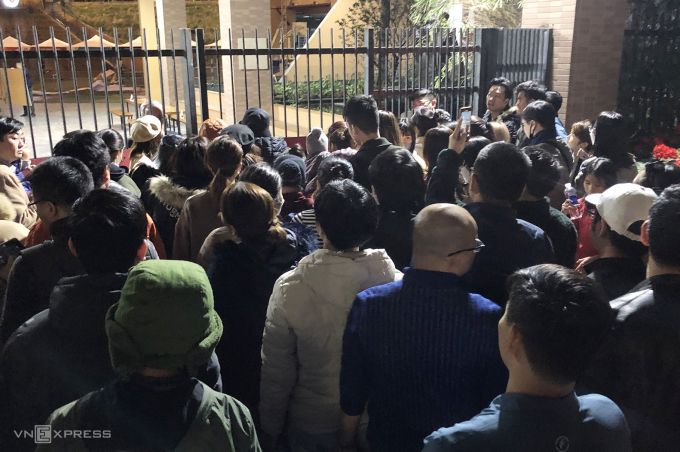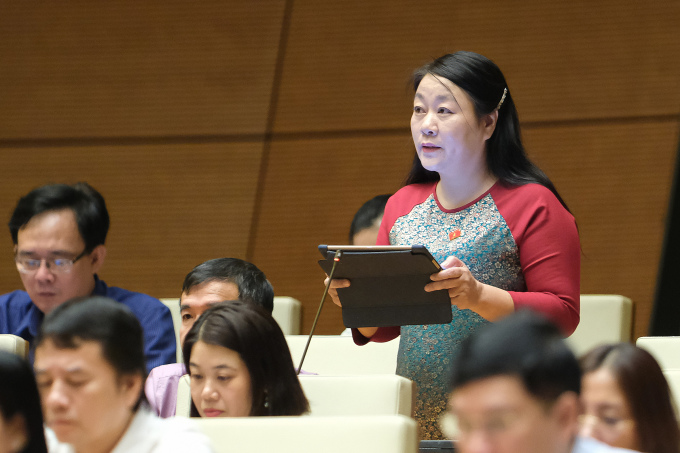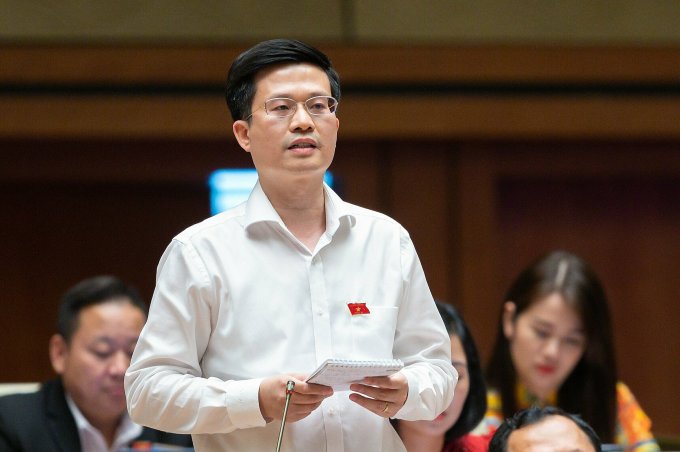Delegate Nguyen Thi Tuyet Nga proposed a specific policy, prioritizing land use for educational development, including exemption or reduction of land use or rental fees.
Discussing the revised Land Law project at the 5th session that just took place, Ms. Nguyen Thi Tuyet Nga, Deputy Head of the Department of Culture and Education, Office of the National Assembly , said that Vietnam is making a strategic breakthrough in human resources, so the land policy for education plays a particularly important role. The experience of many developed countries, especially the US, with regulations on granting land to build universities, has created a launching pad that has contributed significantly to accelerating growth.
According to Ms. Nga, land planning for education in many localities is still inadequate, lacking land funds to build schools, especially in big cities. Socialization policies are still stuck, mainly due to land policies. Without strong enough policies, "it will lead to inequality in education, distorting the policy of socialization in this field."
Meanwhile, the draft revised Land Law does not have separate regulations on educational land but combines it with public service units and other fields. "The draft does not have specific, specific, clear, and strong enough policies for the socialization of education," Ms. Nga said, adding that the draft is equating the land policy of non-public schools, including private non-profit schools, with economic organizations.
Therefore, the female delegate of Quang Binh delegation proposed to design a separate provision on the policy to encourage priority use of land for educational development.

Hundreds of parents waited from afternoon to night to submit applications for their children to enter first grade at Marie Curie School, Hanoi, February 2023. Photo: Ngoc Thanh
Agreeing with the Drafting Committee on removing the regulation that autonomous public schools must pay land use fees and adding a regulation that public service units are allocated land by the State without collecting fees, but Ms. Nga suggested more clearly defining the priority content for autonomous public schools.
Regarding land policy for socialized education, Ms. Nga proposed adding public schools operating on a non-profit basis and not equating non-profit private schools with economic organizations.
She also proposed adding to the draft regulations on exemption and reduction of land use fees and land rent for non-public schools, especially non-profit educational institutions. "It is necessary to consider adding to the draft regulations on land to implement PPP projects in the education sector," Ms. Nga suggested.

Delegate Nguyen Thi Tuyet Nga. Photo: National Assembly Media
Sharing this view, delegate Do Chi Nghia, Standing Member of the Culture and Education Committee, said that Vietnam is socializing education. Schools from kindergarten, primary to secondary schools are all lacking and are relying on investment resources from society. Hanoi has just organized a very stressful high school exam, because public schools only meet 60% of students' needs. Therefore, Mr. Nghia said that if only giving priority to exemption and reduction of land use and rental fees as in the draft, it will make it difficult for education investors. "This also directly affects the future of our children," he said.
According to Mr. Nghia, many private schools are now of good quality and are trusted by parents. Many educational investors are not only interested in profits but are passionate about this career. Therefore, the Drafting Committee "should carefully consider investment resources for culture and education as a direct investment in the future of our children". The draft needs to add regulations on exemption and reduction of land use and rental fees for non-public educational institutions.
Mr. Nghia hopes that this priority will create good results, against short-term thinking in education business, grabbing and increasing tuition fees at all costs, pushing the burden onto learners, preventing the opportunity to go to school for future generations, especially children from poor families.

Delegate Do Chi Nghia. Photo: National Assembly Media
Sharing the same concern, delegate Nguyen Truc Anh, Director of the Hanoi Department of Planning and Architecture, proposed to include projects of parks, gyms, sports, schools, hospitals, and entertainment in the land acquisition list. This matter was decided by the Provincial People's Council.
For many years now, in big cities, due to the rapid increase in the number of students while the number of public schools has not been able to meet the demand, parents have had to line up overnight to submit applications for their children.
In 2022, with more than 79,600 students in public kindergartens, primary and secondary schools, all classes in Hoang Mai district, Hanoi had a number of students exceeding the regulations; the whole district lacked 36 schools.
Source link


![[Photo] President Luong Cuong receives President of the Cuban National Assembly Esteban Lazo Hernandez](https://vphoto.vietnam.vn/thumb/1200x675/vietnam/resource/IMAGE/2025/9/30/4d38932911c24f6ea1936252bd5427fa)
![[Photo] The 1st Congress of Phu Tho Provincial Party Committee, term 2025-2030](https://vphoto.vietnam.vn/thumb/1200x675/vietnam/resource/IMAGE/2025/9/30/1507da06216649bba8a1ce6251816820)
![[Photo] Solemn opening of the 12th Military Party Congress for the 2025-2030 term](https://vphoto.vietnam.vn/thumb/1200x675/vietnam/resource/IMAGE/2025/9/30/2cd383b3130d41a1a4b5ace0d5eb989d)

![[Photo] General Secretary To Lam, Secretary of the Central Military Commission attends the 12th Party Congress of the Army](https://vphoto.vietnam.vn/thumb/1200x675/vietnam/resource/IMAGE/2025/9/30/9b63aaa37ddb472ead84e3870a8ae825)
![[Photo] Panorama of the cable-stayed bridge, the final bottleneck of the Ben Luc-Long Thanh expressway](https://vphoto.vietnam.vn/thumb/1200x675/vietnam/resource/IMAGE/2025/9/30/391fdf21025541d6b2f092e49a17243f)

































































































Comment (0)